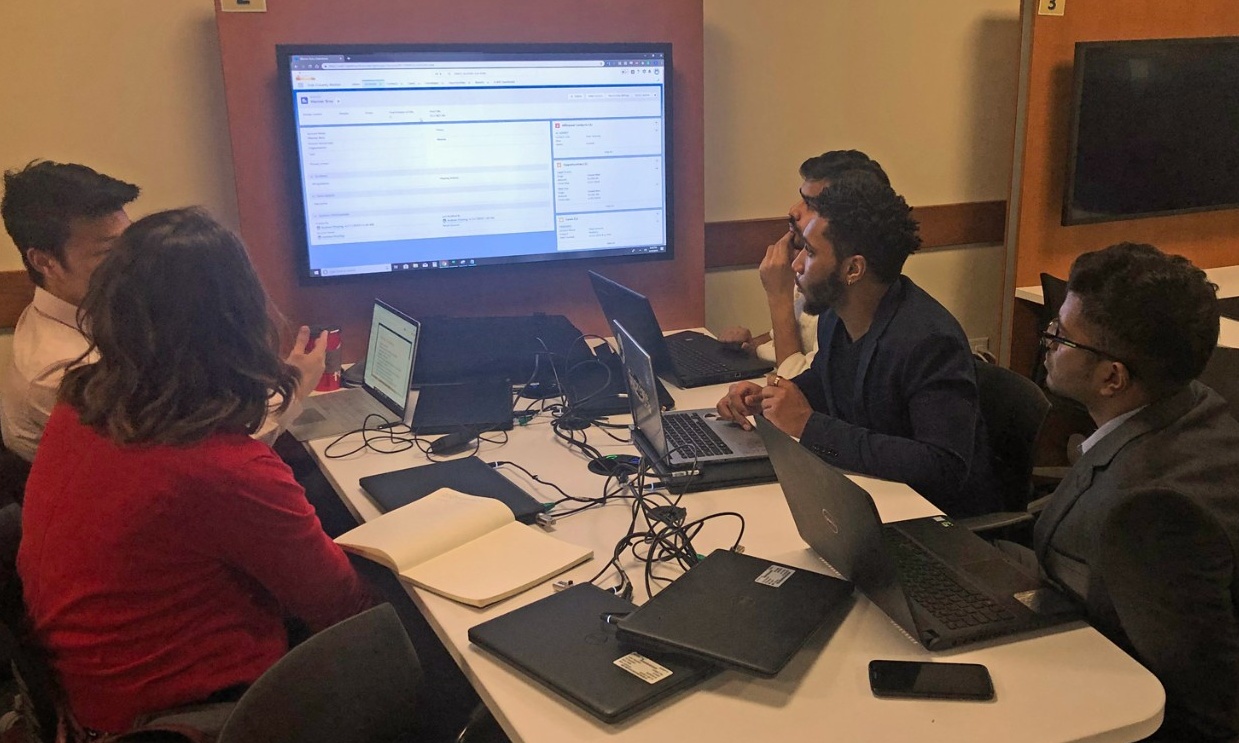Tech consulting class makes social impact
In new UB School of Management course, students use Salesforce to help nonprofits improve database management
May 2019

The nonprofit Tool Library participated in the first two semesters of "Salesforce Consulting for Social Impact," a new UB School of Management course. Photo: Onion Studio
Working together using Salesforce, students in the class created database solutions to help local nonprofits manage their fundraising or volunteers.
The Tool Library aims to provide communities the tools they need to create change. Previously, the volunteer-run nonprofit’s donation information was spread across several spreadsheets and piles of paper, limiting its ability to scale its services.
Soon, however, the organization will be able to better track and manage its donations through a centralized database using Salesforce—all thanks to a class and students from the University at Buffalo School of Management.
“As an all-volunteer organization, we’re always looking for ways to work smarter, not harder,” says UB alumnus Darren Cotton, president of the Tool Library. “Tools like Salesforce are critical to helping us professionalize our operations, extend our reach and increase our impact.”
In the “Salesforce Consulting for Social Impact” course, students learn the principles of databases and technology consulting, and immediately put that knowledge to practice by working with a local nonprofit to design, create and deploy a system to manage their fundraising or volunteers. In addition, both the students and nonprofit participants receive a crash course in Salesforce, a customer relations management (CRM) platform used by more than 150,000 organizations worldwide.
Open to School of Management undergraduate, Master of Science and MBA students, the innovative class was designed and led by co-instructors David Longhini, BS ’14, and Daniel Franasiak, BS ’17, MBA ’18, with initial support from David Murray, clinical associate professor of management science and systems.
“Salesforce is so widely used that even if all we did was teach students how to use the platform, they would be primed for fulfilling careers in any industry they choose,” says Longhini, Salesforce partner enablement manager at Click. “Beyond that, students gain invaluable skills in consulting, change management and understanding how businesses use technology to enable their teams to succeed."
During its first two semesters, the class engaged the following nonprofits: the Foundry, Goodwill of Western New York, Designing to Live Sustainably, Rahama, Grassroots Gardens, Groundwork Buffalo and Erie County Restorative Justice Coalition, along with the Tool Library. Students met with their nonprofit, virtually and in person, an average of six to eight times during the semester to understand their goals, review questions and progress, and ultimately train the nonprofit leaders on the solution they created.
Eric Travis, an undergraduate business student concentrating in management information systems (MIS), worked with the Erie County Restorative Justice Coalition, which creates safe spaces for individuals involved in conflict to come together. The organization needed a system to better manage its caseload, so Travis and his team created a solution that includes a client database, report dashboard and donation manager.
“I wish every MIS student could have this experience,” says Travis, who gained an internship in Salesforce consulting after completing the course. “Learning from leaders in the technology consulting industry will set me apart in a competitive space. This class has, for sure, helped me get a leg up in my career.”
The course is a win-win for the students and organizations. It already has a long list of potential nonprofit partners for the fall 2019 cohort, and Franasiak says other universities are looking to replicate their model.
“Both the students and nonprofits were able to develop incredibly in-demand skills that have the ability to transform organizations,” says Franasiak, senior consultant and solution architect at SparkOrange.
For Cotton, who founded the Tool Library while he was a UB student, the class shows how universities, nonprofits and businesses can come together to do good.
“Students are one of the greatest untapped resources in our community,” he says. “By giving them an opportunity to engage directly with the Western New York community, especially through the work of mission-driven organizations, it allows them to see the impact their skills, knowledge and passion can have on some of today’s most pressing issues.”
